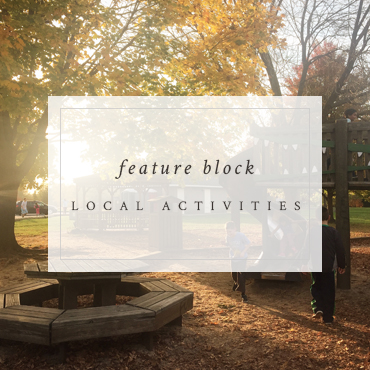Before I gave birth to my first child (my son, Gavin), I was obsessively reading parenting books in hopes to prepare myself for becoming a parent. At the time, my mom saw me freaking out and gave me some great advice…“you were born to do this, trust yourself”. She was right, for thousands of years parents have become parents without books and the internet to use for guidance.
However, during all of the manic pre birth reading, I did find that I lean more towards attachment parenting style. (Per webmd, this means: that babies learn to trust and thrive when their needs are consistently met by a caregiver early in life.). After 12 years of parenting, I can say that taking this approach has worked very well for our family. Thankfully, having our second child, Natalia, was much easier after having 4 years of parenting experience under my belt and the books weren’t as necessary.
After all of that pre baby panicking, I am so relieved that my worst nightmares did not come true. Sure there is the every day normal kid behavior that is expected but that’s what it means to be a human being. I feel grateful I have enjoyed every single stage so far, despite some being harder than others and nervous about the teenage years. I feel very fortunate that when are out in public, we are often complimented by strangers on how well behaved our children are. (One man even gave them $20 each for their good behavior.)
I write this post as a mom that has learned a lot in the past 12 years and wants to help calm any worries a new parent may be having at the start of their journey. Thankfully, there are ways that you can “fill your child’s cup” and help create a positive environment for them to grow. You can give them a stable, loving, and safe foundation to rest in and help meet their needs. Most of this is simple, common sense but sometimes it is the simple things that need repeating AND are the most influential.
1.) Connection before correction.
The best advice I was given regarding behavior problems with your children is the saying “Connection before correction.” When your child is melting down, it can be easy to lose your patience and want to yell in order to stop the behavior. As a parent myself, I know we have all been there and regret the behavior. However, no kid is choosing this behavior and it feels awful to them. This is when a deep breath and some compassion are very helpful at defusing this stressful situation.
While most people think of toddlers when tantrums/meltdowns are mentioned, while those meltdowns are very common and very real, school age kids are often forgotten. The post school meltdown is a very frequent meltdown in my experience, esp since that period of time is way longer than the toddler years. After being on their best behavior all day at school, they come home to you as their safe space to let it all out. Often when my kids are having a meltdown, I will ask them if they want to sit on the sofa with me. I will just sit and hug them until the feelings pass. It lets us to connect and then once the big feelings are processed, we can tackle whatever problem. This works for both little kids and big kids, sometimes they just need to let their feelings out.
2.) “Al dente style parenting”.
So often I describe my parenting style as al dente…firm but tender. I do feel like I am a “strict” parent in many ways. Raising my kids to be productive members of society is a big deal to me and I don’t take it lightly. At minimum, I don’t. want people to dread seeing my family roll up. However, I don’t rule with an iron fist and do make sure that “strict” parenting is balanced with love and compassion. In my experience, when you are too stern or too soft, lots of behavioral problems occur. Children need structure and rules as much as the tenderness and compassion.
3.) Chores, chores, chores.
“If you want children to keep their feet on the ground, put some responsibility on their shoulders.” – Abigail Van Buren
Incorporating daily chores into your child’s life helps your child feel valued within the family and improves their self worth. Keeping a house running smoothly needs to be a family effort. As the old saying goes “many hands make light work”. I like to remind the kids that the more help they give, the more free time we will have to spend doing fun stuff.
4.) “Be the change you want to see in the world.”
You can talk to your children until you are blue in the face but actions speak louder than words. If you want your children to be compassionate then they need to see you acting in compassionate ways. If you want your children to be warm and friendly, then they need to see you being warm and friendly towards others. If you want your children to have amazing friendships, then they need to see you being an amazing to your friends. If you want them to be apologetic when they make a mistake then they need to see you apologizing to them and others when you mess up.
I often tell my children to leave a space better than they found it. However, they learn that lesson much faster by seeing me clean up the shopping carts at the grocery store parking lot or helping someone struggling at the check out line than me barking orders.
5.) Let them take risks.
From a very young age, it is easy to want to wrap your child in bubble wrap to ensure that they don’t severely hurt themselves. However, I have learned that they need to take reasonable risk at a young age in order to improve their self confidence and minimize the need for big risk when they are older.
Sometimes it doesn’t feel comfortable to let my kids take risk. I try to counteract this feeling by envisioning the big risks they might take without my supervision when they are older and the consequence are much greater.
We are fortunate to have lots of mature trees on our street. The kids on the street love to climb these big trees. In the pictures above, you can see my son climb fairly high on our neighbor’s tree. He was so proud of himself when I went to take his picture.
6.) Less stuff, more experiences.


The earlier you start traveling with your children, the faster they will be used to being in the car/plane/train. My in laws lived a few hours away so early on we were regularly in the car for hours from the get go. The real test was when we drove across country when our kids were 2 and 6. We spent a month out west in our small Subaru Outback (just for the driving part). Amazingly enough, despite being in the car for 8 hours at a time, they did great. They did a lot of drawing, watched some movies, and just enjoyed the drive. I know parents may cringe at the thought of spending so much time in the car at such a young age. They envision the worst and want to put off traveling until the kids are older. If travel is important to you, I highly recommend you start traveling when your kids are young so they will learn to adapt.
If you are interested in learning more about our cross country road trip, I blogged about it in detail. Click here to see our cross country adventure.
You don’t have to go across country for an adventure. Look for something new to do in your own “backyard”. The money spent on your outing will be far more valuable than a toy that becomes forgotten and adds to the clutter.
7.) Fail is not a dirty word.

I often remind my kids fail just means First Attempt In Learning. You learn way more from your mistakes than successes. I know people who have had a lifetime of success and then they fall apart when they finally do struggle. As someone that has struggled with ADHD their entire life, I wouldn’t change it for the world. It has shaped the way I see the world and increases my creativity and empathy. They say that many CEOs have ADHD because they are less risk adverse. Putting too much pressure on being “perfect” and shielding your child from failure will end up hurting them in the long run. Let them fail in small ways while they are younger so the consequences aren’t as severe.
8.) Let them be bored.

There are great benefits to being bored. Not having a scheduled activity or a tablet to play with is very beneficial to their developing brain. Our children will play for hours outside with the neighbor kids. I love that despite multiple age ranges being involved, they all find a way to get along and create new games so no one is excluded. When we go out, I have the kids bring books with them. They will read in the car on the way to where we are going or will bring the books into a restaurant to fight any boredom while we wait. Getting into the habit of grabbing a book whenever we left the house is a habit I am so happy they developed. Our family definitely watches our fair share of tv/movies…we love family movie night…but reducing the amount of screen time whenever possible is very helpful for their brains, behavior, and development.
9.). Get on the floor and play with them.

Now to be honest, this is something my husband is much better at than I am. I can get antsy when playing on kids terms for lengthy amounts of time. However, I do see how excited the kids get when I do stop and take the time to play with whatever they are interested in at the moment. When my son was very little, he loved when I set up his train tracks. The designer in me got excited about designing the layout. As they get older the train tracks on the floor may become basketball in the driveway but it will be equally as important. Even if you just sit down and play for 10 minutes, it will mean the world to them.
10.) Give them the benefit of the doubt.

Kids have an innate want to please their parents. They aren’t purposefully trying to make your life more difficult or to anger you. I have found that giving my children the benefit of the doubt during times of conflict is much more productive than assuming the worst. For example, our family was outside doing yard work and we asked the kids to grab something from the house. It was taking much longer than needed and my husband started to get impatient, thinking that they were horsing around, trying to get out of doing yard work. I told him, they’re good kids, they probably have a reason for why it is taking so long. When they finally returned, they came with plates of food and drinks as nourishment for us to get through the yard work. My husband instantly felt awful. That is a small example but just by giving your child the benefit of the doubt in any situation turns a moment of conflict into a team building exercise. Your child will feel grateful knowing that you won’t fly off the handle at the slightest misstep and will create a closer relationship.
11.) Be your child’s advocate.

This lesson won’t apply to all parents but will help a large group of parents. In general, you need to be your child’s advocate. You need to stick up for them as they grow up plus teach them to be their own advocate. However, I would like to specifically talk about addressing some developmental issues and getting them help through early intervention at a young age.
When Gavin was 18 months he had a speech regression. He already didn’t have a huge word bank but he all of the sudden dropped words like, Elmo, from his vocabulary. This alone had me worried. I signed him up to be screened by Philadelphia’s early intervention program. Thankfully he was assigned a speech therapist that worked wonders. (Side note: there can be a long wait to get into these programs so it is best not to waste any time and sign up asap if you see an issue that needs to be evaluated.)
In addition to the speech delay, he chewed everything…and I mean everything…from books to concrete. Plus the boy rarely walked, but ran everywhere. We lived in South Philadelphia at the time so that could become dangerous. He fell and injured himself so often that I thought child protective services might take him away. Not only did he run everywhere, he also liked to climb up my body and sit on my shoulders. It was an amazing feat to watch. To top it off, he would freak out when I took him to the local music class. He literally tried to escape. All of these things were exhausting but it was my first child so I had no barometer as to what was normal and was very confused. My friends were really worried I might have a break down at this point of my life.
Thankfully his speech therapist noticed that Gavin tripped often and said he may have a mid line crossing issues. (Basically, he had a problem any time something had to cross over the middle of his body.) I agreed and looked into more support. First I got him screened at the Children’s Hospital of Philadelphia. He was diagnosed with Sensory Processing Disorder (and then ADHD later in life). He was sensory seeking by running, climbing, and chewing everything. However, he was sensory avoiding when we went to music class and he was trying to escape. Thankfully CHOP put him into their amazing Occupational Therapy program plus he received more services from Philadelphia’s early intervention program. Getting this occupational therapy gave me a new son by the end of each session, the work they do is simply amazing. I also made an appointment with a Developmental Pediatrician at AI DuPont Children’s hospital to get additional confirmation on just what was going on. As he aged he continued to get support and still receives some form of support as a middle schooler.
I share this information because I don’t feel like it is talked about enough. Trust your gut as a parent if you feel like there is an issue even when some professionals aren’t seeing it. My father is a pediatrician and still did not see what I saw in my son (his grandpa goggles made his grandson perfect in his eyes). If it wasn’t for me observing how his behavior was different from most kids on the playground/play classes, questioning why my son was acting in this manner, searching the internet obsessively, and repeatedly reaching out to professionals, he would not have started to receive help until he was much older. The older they start into therapy, the harder it is to make progress. Please listen to your gut.
As a side note: Over the years I have learned that some parents are not kind to their child’s early intervention therapist or IEP teachers. This baffles my mind and breaks my heart. We have met the most amazing teachers and therapists over the years. They pour their heart into these children and are so crucial to your child’s progress. Please treat them with kindness and gratitude.
So that’s what I have learned over the past 12 years of parenting. Like all parents, I am still learning and am far from perfect but I’m trying my best. My son turns 13 this month and we move into the teenage years…pray for me. I hope that I have laid out enough of a foundation to weather the next years of hormonal fluctuations. 🤞
I thank you if you actually made it to the end of this post and hope that something was helpful. 🥰
If you have some parenting advice that you find helpful, please let me know in the comments. It takes a village to raise a child.
Cheers!
Claire







